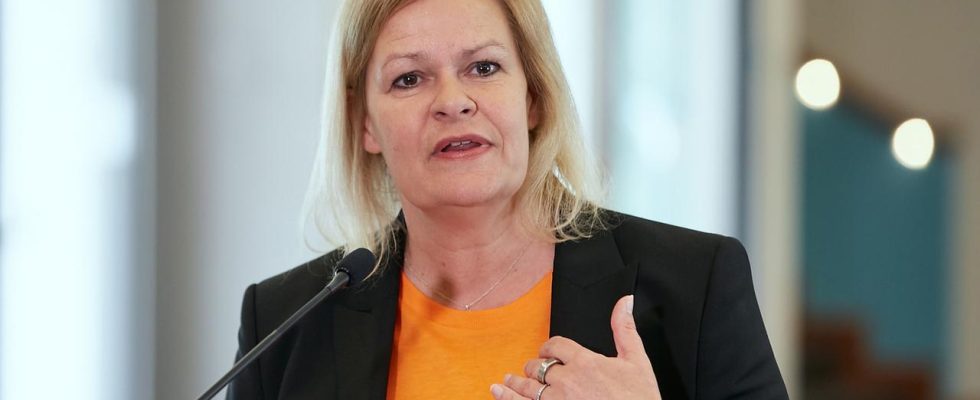The EU interior ministers are discussing a reform of asylum policy. The project has been controversial for years. Interior Minister Faeser wants to achieve a breakthrough – and is taking a political risk.
Nancy Faeser hopes that an agreement can be reached. “At the moment, many states have the unconditional will, so that it could actually work,” says the Federal Minister of the Interior, cautiously optimistic. The SPD politician has been on the road a lot in the past few weeks; met her colleagues from the EU. After that, Faeser made it clear again and again that there could be movement again in the deadlocked European asylum policy. Faeser spoke of a “historic momentum”.
Julian Pahlke disagrees. The Greens member of the Bundestag is often on the move as a civil sea rescuer in the Mediterranean. He doesn’t believe that the interior ministers can agree on a reform of asylum policy: “To be honest, I don’t see this historic momentum,” said Pahlke in an interview with the ARD Capital Studio. The problem from his point of view: The countries on the Mediterranean would continue to feel left alone by the rest of the EU – because no mandatory distribution of refugees is planned. The border procedures would not change that.
Boundary procedures for specific groups
The border procedures are intended for people who generally do not have a high chance of being recognized as asylum seekers. It is estimated that one in four would have to go through border procedures, for example people from Georgia, Bangladesh and Pakistan. Syrians or Afghans, who are currently making the most asylum applications in Germany, would continue to go through a normal procedure.
For the border procedures, people have to wait up to three months in accommodation on EU soil near the external border. During this time, the authorities will check whether your application is admissible. If that is the case, people are officially allowed to enter the country. If it says no, they have to go back to their home country.
Skepticism among SPD and Greens
A month ago, the federal government mentioned these border procedures to the federal states and local authorities as a way of reducing migration pressure. The Green MP Pahlke thinks that is window dressing. In the traffic light coalition, even more think like Pahlke.
In a position paper, 30 young MPs from the Greens and SPD have warned against weakening the fundamental right to asylum. It says, for example: “Under no circumstances should minors and their parents be involved in such a border procedure.”
Faeser under pressure from all sides
This is exactly what Nancy Faeser wants to achieve. Even if other positions can be read, the federal government has, in her words, a “united position”. On this basis she will negotiate in Luxembourg. Whether Faeser can prevail there is an open question. Because the EU Commission had proposed that only families with children under the age of twelve be exempted from the border procedures.
The pressure on the Federal Minister of the Interior comes from all sides when it comes to asylum policy: There are different interests within the EU; some in the traffic light find their course too restrictive; and the Union in the Bundestag, the exceptions sought by Faeser go too far.
The CDU domestic politician Alexander Throm fears that Faeser wants an agreement “at any price”. She is also willing to accept “the lowest common denominator” just to be able to demonstrate success.
What role does the election campaign play in Hesse?
Throm utters in conversation with that ARD Capital Studio the assumption that Faeser is thinking about her election campaign in Hesse. The SPD politician wants to become prime minister there in the fall. So far, she has hardly campaigned in her home country.
In polls, your SPD is well behind the governing CDU. Success in EU asylum policy would be important – for Faeser personally too. The Federal Minister of the Interior tries with purposeful optimism. After the large refugee movements in the 1990s and in 2015/2016, the EU “cannot afford” the reform to fail. Because otherwise the open borders in Europe would be in danger.

